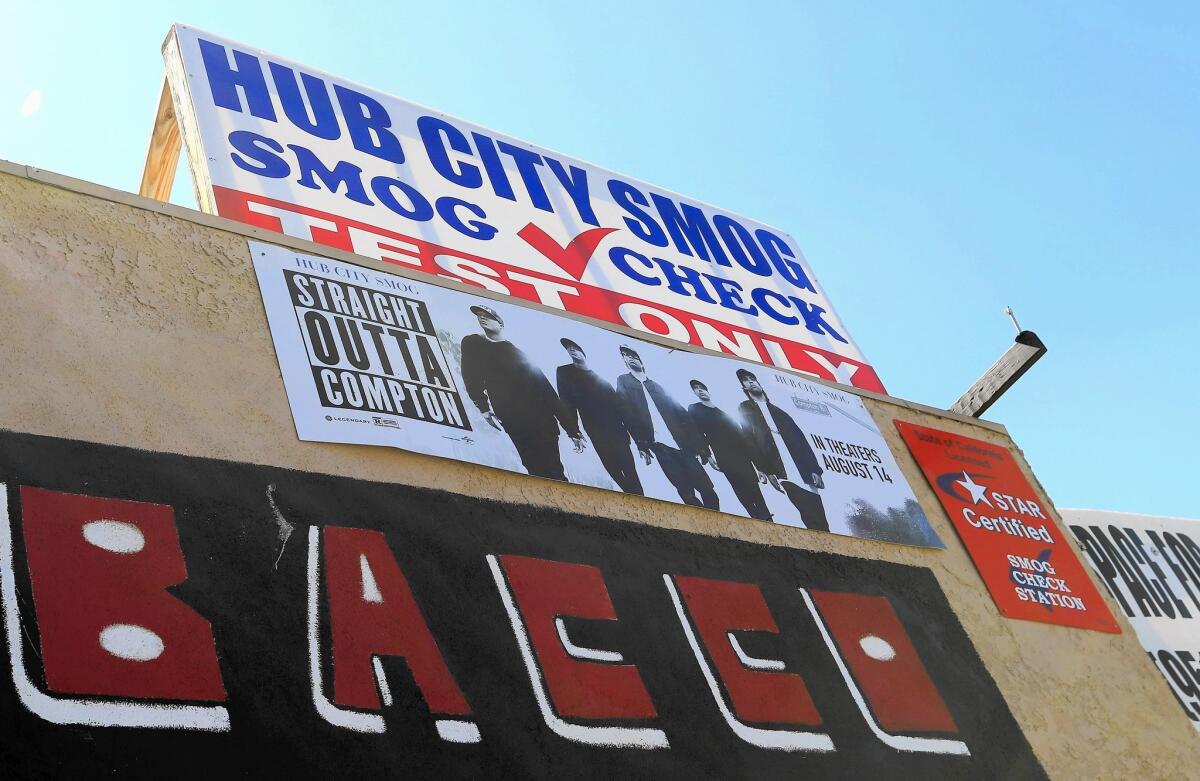Compton welcomes native rapper Dr. Dre’s gift

- Share via
When Dr. Dre and his N.W.A bandmates released their 1988 debut album “Straight Outta Compton,” they immortalized the city as the birthplace of West Coast gangsta rap.
Over the next few decades, many of those involved in the scene moved on. Compton has seen a slow revitalization and is beginning to shed the reputation for violence, blight and gang activity that the music helped spread around the globe.
This week, a bit of the old Compton caught up with the new Compton.
The city’s legendary native son, Dre, said he will donate his artist’s royalties from his anticipated new album to fund a performing arts center for the city’s youth.
The album, which is named for the city and includes songs about it, is putting a new focus on the gangsta rap years, as is a film chronicling N.W.A’s rise and fall that will be released next week.
“I’ve been really trying to do something special for Compton and just couldn’t quite figure out what it was,” Dre told Beats 1 radio DJ Zane Low in an interview Thursday. Compton Mayor Aja Brown “actually had this idea and she was already in the process of working on it. I said, ‘Boom, this is what we should do,’” he said.
Dre, whose given name is Andre Young, left the band and became a successful music producer before co-founding Beats Electronics. He and music mogul Jimmy Iovine sold Beats to Apple last year for $3 billion.
He raised some eyebrows in Compton two years ago when he and Iovine gave USC $70 million for a new art and technology academy. Some in Compton questioned why Dre did not give money to historically black colleges or schools in his hometown.
With news of the donation to the arts center, Dre seemed to be the toast of Compton on Friday.
“I got a lot of respect for the man,” said Tim Williams, 21, as he sat on a stool behind the city’s famous barbecue joint Bludso’s during his lunch break. “He doesn’t have to do that. It is amazing.”
Rick Bludso, 51, came of age in Compton as a gang member during the violent years that N.W.A depicted in their music. He left that behind him and now works in gang intervention and in his family’s restaurant.
The arts center, he said, will give Compton’s youth something they desperately need: a safe haven to learn marketable skills.
“It will give kids something to do during these long summers,” he said. “It is real good thing, a real good thing.”
Over on Compton Boulevard, 18-year-old Carlos Velasquez was getting a haircut at Murillo’s Barber Shop. He said he had listened to Dre’s new album the night before.
The album features other Compton stars, including young phenomenon Kendrick Lamar, musing on their hometown.
The album doesn’t mince words, referencing the “stone cold killers in these Compton streets” and other harsh realities of life on the street. Dre also recalls his youth “selling instrumentals off a beeper” before he made his fortune as a producer and businessman.
Velasquez, who grew up in Compton, said he was glad to hear the music mogul had not forgotten his roots.
“He is giving back to the community he came from,” Velasquez said. “That is pretty badass.”
City Councilwoman Janna Zurita, a self-described gangsta rap fan who went to prom with N.W.A member DJ Yella, said it was time for Compton to embrace its role in popularizing the genre.
“We should be benefiting from putting rap and gangsta rap on the map,” she said.
Compton is a different place than when N.W.A formed. Crime — particularly homicides — has fallen dramatically. And the city is beginning to lure more chain retailers that once shunned Compton.
Brown said Dre is now helping Compton move forward.
“He clearly has a heart for Compton, especially our youth,” she said in a statement.
[email protected]
Twitter: @jpanzar
More to Read
Sign up for Essential California
The most important California stories and recommendations in your inbox every morning.
You may occasionally receive promotional content from the Los Angeles Times.











